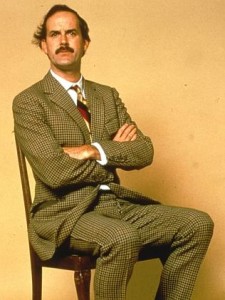 Fawlty Towers almost didn’t make it to the viewers’ screen. Nearly landing in the back room, the graveyard of would be sitcoms, Fawlty Towers ran its pilot episode, and was completely panned by the executive producers. Too contrived, dated and comically predictable were some of the criticisms. Not sophisticated enough for audiences who were becoming more discerning in their taste for entertainment. Comments made to the effect that it was too vaudevillian and dated, were among the disapproving banter.
Fawlty Towers almost didn’t make it to the viewers’ screen. Nearly landing in the back room, the graveyard of would be sitcoms, Fawlty Towers ran its pilot episode, and was completely panned by the executive producers. Too contrived, dated and comically predictable were some of the criticisms. Not sophisticated enough for audiences who were becoming more discerning in their taste for entertainment. Comments made to the effect that it was too vaudevillian and dated, were among the disapproving banter.
Ian Main, the BBC’s editor in 1974 nearly flushed the pilot down the plumbing and is quoted as having said: “ A collection of cliches and stock characters which I can’t see being anything but a disaster.” Fortunately, he was wrong. It was televised and every subsequent week since it first aired, its fan base has grown worldwide by the millions. In fact, at the turn of the century, Fawlty Towers was declared the best TV series of all time by the British Film Institute. Its regard of John Cleese’s “moments of genius” throughout the 12 episodes have been acclaimed as untouchable and unforgettable.
Fawlty Towers is now taking to the stage, the Australian stage With John Cleese’s blessing and in fact collaboration, a 2016 revival in Sydney is in the making. Cleese will be behind the scenes as a consultant. Another actor has been chosen to fill the delightfully demented, ill-fitting British skin of Basil Fawlty. The actor is Australian, which begs the question, can he pull it off? Basil is Cleese and both are very British.
Fans know that the physical and verbal presence of this gifted actor and co-creator of Fawlty Towers was and still is the cornerstone to the complete make-up of the production. Of course, the entire creation hangs on the character of Basil, and if the audiences are not won over, the total remaining cast combined will mean very little to the salvation of the play. Iconic associations can be both a blessing and a curse, and Cleese knows this only too well.
 Here’s the issue: Are fans willing and flexible enough to accept anyone messing around with their perception of perfection? The episodes are considered classics. Does the stage give liberty to those who want to re-create the classics? In all candor and respect, greater works than Fawlty Towers have stood the test of reinvention and re-imagining.
Here’s the issue: Are fans willing and flexible enough to accept anyone messing around with their perception of perfection? The episodes are considered classics. Does the stage give liberty to those who want to re-create the classics? In all candor and respect, greater works than Fawlty Towers have stood the test of reinvention and re-imagining.
Just recently another rendition of Camelot was released on Netflix, and how many times have the classics of Shakespeare been re-interpreted and delivered to adaptive, appreciative audiences? Nonetheless, there is a sense of ownership held by the fans for certain characters and story lines. Too much fiddling around with the original might lose the interest of even the most ardent devotees.
It’s a risk, but if anyone can pull it off, it would have to be under the direction and guidance of the original Basil. John Cleese is known as a perfectionist when it comes to his craft. That cannot be easy to work with, but if the idea of a successful stage production is anywhere to be realized, it will take a precise interpretation. If it’s a winner in Australia, the company will travel worldwide to the happy embrace – and skepticism of fans everywhere.
Naturally we hope Cleese and company can pull it off. It would bring more laughter into the world, and that’s something we never have enough of. I for one am keeping an open mind. I’ll be keeping a watch out for upcoming reviews in the hopes that a production would be scheduled closer to home sometime soon.
What are your thoughts? Do you think a revival of Fawlty Towers is an idea whose time has come?